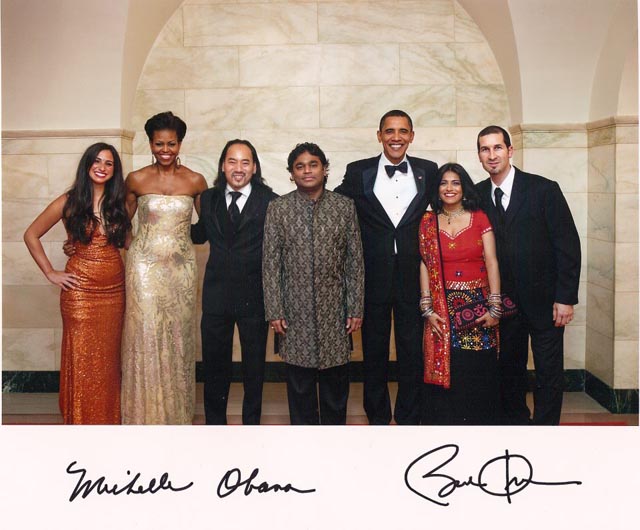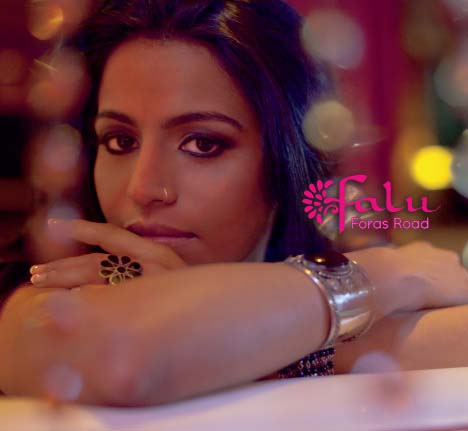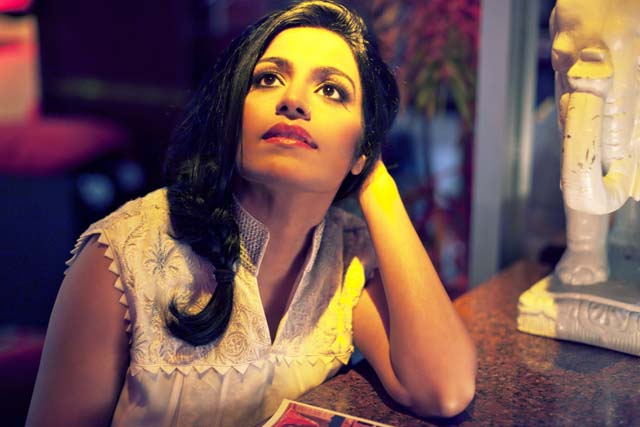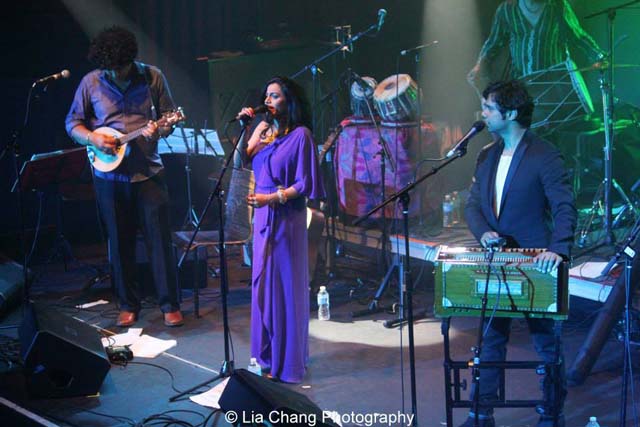
Falu – Indian Diva in America
She’s sung for President Barack Obama, First Lady Michelle Obama, the Dalai Lama and Oprah Winfrey. She’s also sung for hardened criminals in the maximum security Sing Sing Prison.
She’s performed with noted names like Yo-Yo Ma, A.R. Rahman, Wyclef Jean, Philip Glass, Ricky Martin, and Blues Traveler. Her songs have also been featured in Angelina Jolie’s directorial debut A Place in Time.
Meet Falguni Shah, popularly known as Falu, a singer from Mumbai who has generated a devoted fan following in New York, and who has blurred the line between different genres of music with her signature style.
At the launch of her new album Foras Road, which is produced by Grammy award winning producer Danny Blume, Falu took to the stage with her east-west band, clad in a purple form-hugging, off-shoulder ensemble. The place was the high energy Highline Ballroom in Manhattan’s trendy meatpacking district where rockers and happening musicians perform. Yet the song which emanated in her powerful vocals was the ancient thumri Bahar – and the crowd went wild. Falu is on a mission to promote classical Indian music to a whole new audience. Little surprise then that the mainstream has embraced Foras Road, and National Public Radio (NPR) streamed the album in its entirety.

10 Questions for Falu
1. Could you share an early memory of how music was part of your childhood?
My mother is a classical singer and my father is a retired stockbroker and I grew up in Juhu. My mother used to sing and she tells me she started me on singing when I was two and a half years old. The earliest memory I have is when I was four and I got a chance to sing in an Amitabh Bachchan movie, ‘Do Aur Do Panch’ in the child chorus. ‘Humko jeene do, jeene do’ – I still remember that song! I couldn’t reach the mike and they gave me a stool to stand on because I was so little.
2. You were trained in music of the Jaipur and Benares gharana by Smt Kaumudi Munshi. How rigorous was this training?
She was my mother’s teacher too so she taught two generations. I started taking lessons from her at the age of 3 and after I finished school, she put me in a 7 years masters program. When I was very young, I remember my mom not feeding me if I didn’t practice my scales. She’d give me a bite after each effort! It was very playful – so I didn’t feel it was work. When I turned 6, I became very serious about singing – then I wanted to do it for myself. At 14 I would practice for 16 hours a day – I would practice like a maniac.

3. Your husband Gaurav Shah is an oncologist and a member of your band. You didn’t have an arranged marriage but would you say you had a marriage arranged by music?
That’s so true – I like that term! Gaurav is the soul of my band. He grew up in Fort Worth and was studying neuroscience at Harvard but was also learning the flute and vocal. After graduating he came to India to learn music and he was in my classes with Smt. Kaumudi Munshi and Ustad Sultan Khan. Obviously the concept of dating was not there so he signed up in all my classes one by one. That’s how we started hanging out together and all we did was sing together! My parents liked him a lot. We got married in Texas.
4. As a visiting lecturer at Tufts University you taught Indian Classical music for 3 years. How was that experience?
It was a fantastic experience – my first introduction to how music works here, how America works. It was a mixed class of all nationalities. Some of my students were older than me – I don’t think I was teaching – I was just sharing what I knew. I guess that’s what started this whole movement of trying to bring this beautiful music into this culture. I also did a lot of small gigs with different musicians. I realized how crazy non-Indians in this country were about Indian music and culture.
5. Over the years you and your musicians have evolved an ‘Indie Hindi’ band and brought both east and west into your repertoire.
The band is made up of diverse musicians and is very eclectic. In our last album, Gaurav wrote ‘In the Rain’ which is an English thumri. That made me think – why don’t we explore the roots of Thumri and really create an entire album as a tribute to Thumris? Foras Road is what that is.

6. Tell us about Foras Road and how you decided to travel that road. Are these songs written by you or are they old classics?
Foras Road is the most famous red light district in Mumbai – and I inherited this semi-classic music from my teacher – there are seven languages in the album. I have learned 5000 Thumris – I always had them, I grew up with them. There are some songs we wrote in that style and some are inherited. We did not write them but re-arranged the music.
7. When you learned classical music in your growing up years in India did you ever expect to be performing in the clubs and concert halls of New York?
I never imagined I would do what I’m doing right now. I started experimenting – sometimes that works, and sometimes it doesn’t and you learn from your mistakes. I found my niche from all the experimentation – small basement sessions for birthdays to festivals to Carnegie Hall – I did to find out where I belong. It just fell in place.
8: You are presenting classical music in a very non-traditional way. In India the raga would be presented in a concert with the singer seated on the floor.
That’s what I want to break because that’s considered their parents’ music by the younger generation. I want to bring this music to them, it’s not just meant for older people. Classical music is passed orally from generation to generation and if we don’t pass it, we will lose it.
If you have an image, if you look cool, if you can be one of them, the young generation will relate to you and the music. We have made an effort to take this old sound but present it in a very cool and hip and modern way. When I sing a thumri it’s exactly as a baiji would sing it but the arrangement with instruments is something that we may not hear in India
9. Your son Nishant is now two and a half years old. Are you going to be mixing up meal times with classical music, as your mother did with you?
Absolutely – but he has to start speaking first!
10. What is your role as Carnegie Hall’s Music Ambassador?
They send me to places where music is not accessible – hospitals, shelters, youth and senior centers. If people can’t come to Carnegie Hall – the music of Carnegie Hall goes there. I was just in Jacoby Hospital in the Bronx – some of the people were in wheelchairs, some with breathing machines. You touch their hearts with music.
We did a show at Sing Sing, the maximum security prison where we weren’t even allowed to say our last names. I think it’s been one of my best shows. That audience, many who were in handcuffs, loved it. Music takes you to the highest levels – for two hours they felt free.
(C) Lavina Melwani
(This first appeared in The Hindu)
